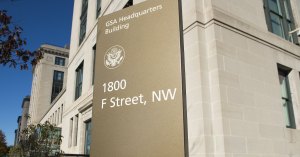 General Services Administration Acting Administrator Dan Tangherlini presented his plan to improve GSA during a Tech Town Hall Meeting on Tuesday at the McLean Hilton. (Photo: David Stegon/FedScoop)
General Services Administration Acting Administrator Dan Tangherlini presented his plan to improve GSA during a Tech Town Hall Meeting on Tuesday at the McLean Hilton. (Photo: David Stegon/FedScoop)In his first public speech since taking office, General Services Administration Acting Administrator Dan Tangherlini called on industry to help the agency provide more savings to its federal customers as well as provide feedback on how the agency can bring in more of industry’s innovations.
Speaking Tuesday at a Tech Town Hall Meeting hosted by ACT-IAC and TechAmerica at the McLean Hilton, Tangherlini said GSA can do a better job providing efficiencies to the federal government and break the silos within the agency that caused it to not run as smoothly as possible.
“We need to re-double our focus on our core mission, and that’s providing the best value possible,” Tangherlini said. “That goal is more significant, more important than it ever has been in the history of GSA than right now.”
Tangherlini said GSA began a top to bottom review of its operations in April that includes employees making more than 500 suggestions and posting thousands of comments how to improve everything GSA does from big to small.
Some of those ideas, Tangherlini said, are already being implemented while the agency is figuring out ways to enact others. He now wants to extend the invitation to industry to find ways the agency can do its job better with no suggestions too large or too small.
“As Senator Barbara Boxer told me when I was testifying my first week on the job, ‘Whatever you are thinking, think bigger,’” Tangherlini recalled. “We are trying to do exactly that. Looking at everything and anything so we can do better.”
Part of that, Tangherlini said, will include a number of new initiatives such as the modernization of the multiple awards schedule that removes unwanted or out of date items (such as typewriters) that can then free up resources for widely used products such as Schedule 70 and MOBIS (Mission Oriented Business Integrated Services) contract vehicles.
Tangherlini also mentioned switching to a demand-based model for schedules to provide a more thoughtful approach toward acquisition.
When it comes directly to information technology, Tangherlini said there needs to be more focus on the “I” of IT, meaning there needs to be greater attention paid to the types of information agencies want instead of just providing them with technology.
With all that said, Tangherlini mentioned a number of successful GSA initiatives he feels have done an outstanding job of helping clients.
For example the Federal Risk and Authorization Management Program program will save users approximately $200,000 each time it’s implemented in cost avoidance. The agency’s travel book system has saved the federal government “tens of millions” in savings and, in fiscal year 2011, the agency helped the government rid itself of more than $1.1 billion in unused federal real estate.
GSA also does work for individual consumers. For example, he said, GSA helped the Department of Commerce examine its wireless contracts, finding more than 3,200 lines that were being paid for, but not being used. By eliminating those, it helped save the agency more than $2 million.
“I look forward to working with you,” Tangherlini told the more than 200 industry members in attendance. “There is a great opportunity for us to help the government save money as well as utilize our industry partners that are bringing the best solutions to the table.”
As for the conference spending scandal that led to him assuming the administrator role following the resignation of Martha Johnson, Tangherlini said there’s been some inner morale issues as employees react to how the agency now conducts its business. With that said, he said there have also been a number of positive reactions as employees focus more on their mission and helping its customers.
“I say that what happened with the Western Region Conference gave us some notoriety,” Tangherlini said. “Now its time to use that and show people the great job we can do for them. We have a great opportunity ahead of us that we are ready to take full advantage of.”




